I Am Eager for Continuous Selfimprovement
Why am I always seeking validation? Why don't people like me? How can I stop being a people pleaser?
If this sounds familiar, you are not alone.
Years ago, as a recovering awkward person, I was totally burned out on people.
I didn't have great friends, I couldn't spark amazing conversation, I constantly felt overextended.
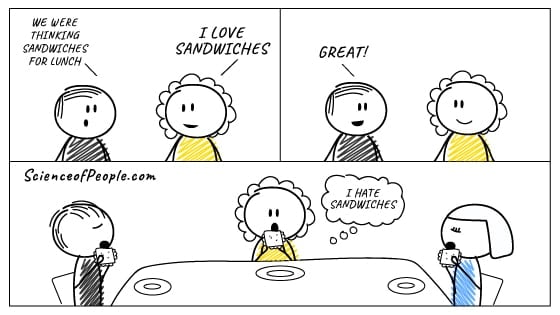
I was saying yes to everything… and everyone.
It's time for you to find your voice, set your boundaries and stop being a people pleaser. This is about being able to take control of your own life!
The only person I want you to please is you .
What is a people pleaser? (Definition)
A people pleaser is someone who tries hard to make others happy. They will often go out of their way to please someone, even if it means taking their own valuable time or resources away from them. People pleasers often act out of insecurity and a lack of self-esteem.
According to Dr. Susan Newman, people pleasers want everyone around them to be happy… and they will do whatever it takes to keep them that way.
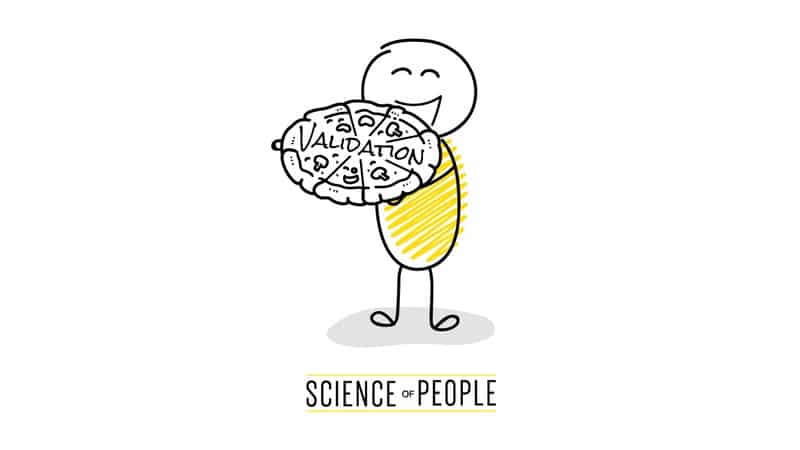
They can often be perfectionists, rehearsing what they're going to say before a phone call, styling their hair meticulously in the mirror, and spending hours browsing the internet for the perfect smartphone that "defines" them.
"For some, saying 'yes' is a habit."
— Dr. Newman
For others, it's almost an addiction. The constant validation gained from being a people pleaser makes them feel like they are needed and useful.
↑ Table of Contents ↑
Is there a People Pleaser Personality?
Yes! Your personality is NOT a choice. People higher in agreeableness tend to be more prone to people pleasing than other personality types. Do you have a people pleaser's personality? Find out by taking our Big 5 Personality Quiz below:
↑ Table of Contents ↑
10 Signs You Are a People Pleaser
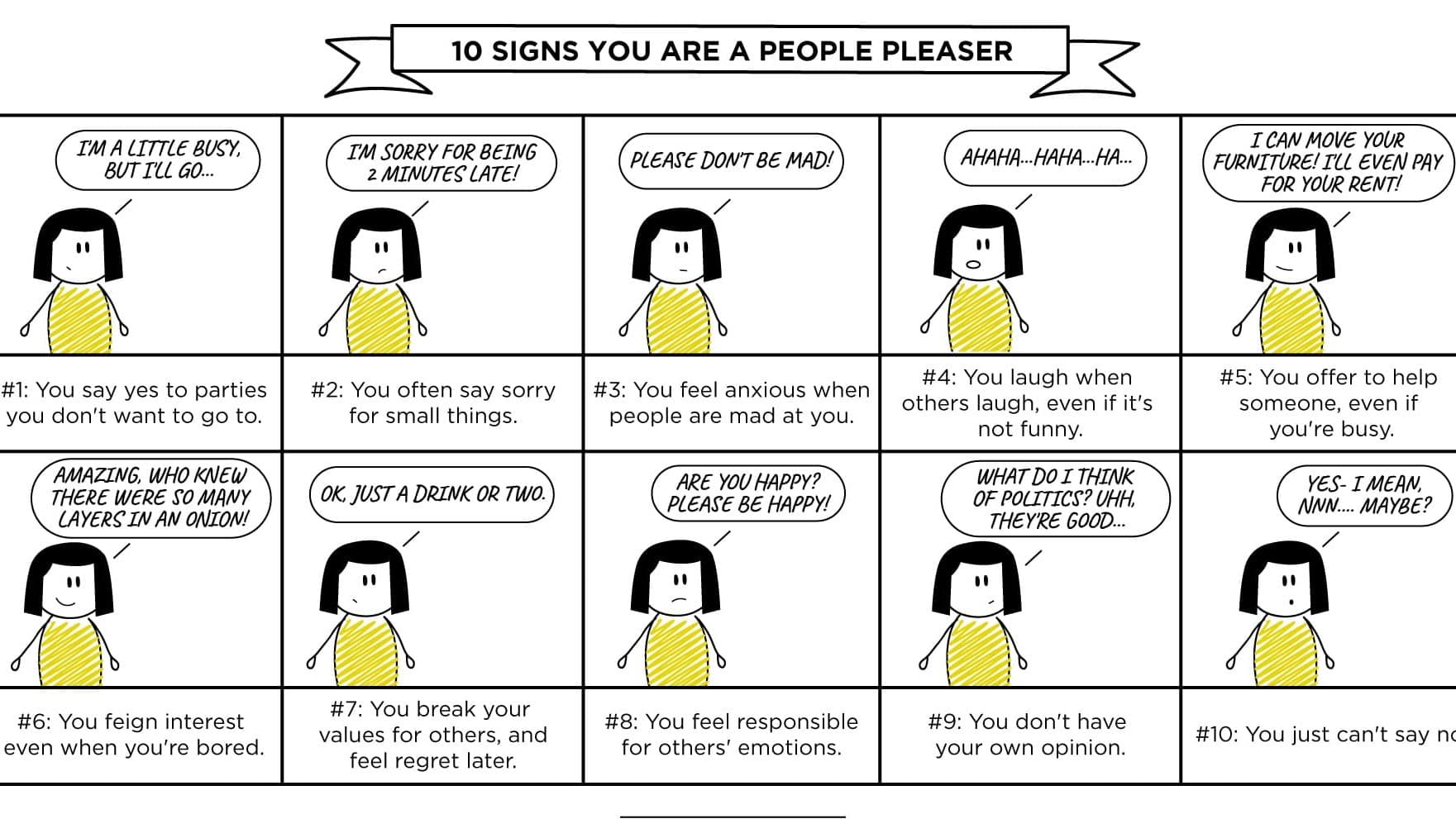
Does any of this relate to you? If you feel like you've been people-pleasing and want to stop, there is hope.
Without further ado, here is what you can do to start saying "no" to others and say "yes" to yourself:
↑ Table of Contents ↑
11 Ways to Stop Pleasing
#1: "Let Me Get Back to You"
Here is my favorite anti-people-pleasing phrase:
"Let me get back to you."
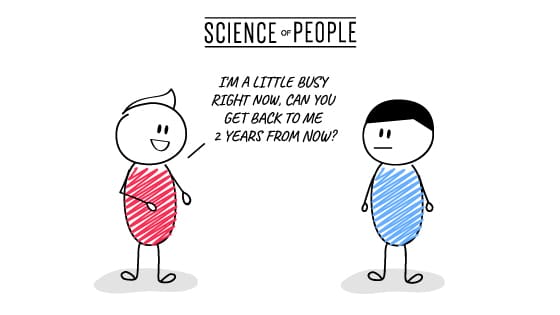
It's extremely hard to say no to someone else's personal request; it's even harder when you are a people pleaser.
So when a friend asks you to help her find a new outfit, you default to "sure." And then you agonize later: "why did I say yes!?"
Or when a colleague asks you to be a part of their project, you'll say "okay," but then immediately regret it. Then you are angry, both at them AND at yourself for saying yes.
Here's the key: Delay the no (or give a well-thought-out yes).
It is CRITICAL for people pleasers NOT to give an answer immediately.
Make a rule for yourself that if someone asks you for something, your default answer is always: "Let me get back to you."
You can say that you have to check your schedule, your to-do list, or your spouse. Do whatever you need to do to buy yourself some time, then you will have some space to think about it and respond on email or text with a polite "no."
This is so much easier than doing it in person. And, it gives you time to make the right choice.
Remember: the right answer, "Let me get back to you" is always best.
↑ Table of Contents ↑
#2: Add Delay
Stop!
Just for 50 to 100 milliseconds.
This small amount of time is all you need, according to a 2014 Columbia University study, to make better decisions.
"This might be the first scientific study to justify procrastination."
— Dr. Teichert
The study, titled "Humans optimize decision-making by delaying decision onset," showed that the human brain needs just 50 to 100 milliseconds to focus its attention on relevant information and block out all distractions.
This is especially true for people pleasers, since it can be an automatic reaction to just say yes to all requests asked of them.
So for people pleasers, this means taking a slightly longer pause before you make any decision to lock in obligations.
And don't worry about the silence! Silence is a completely normal part of any social interaction, and even makes you seem more confident and powerful!
↑ Table of Contents ↑
#3: Start with Small Noes
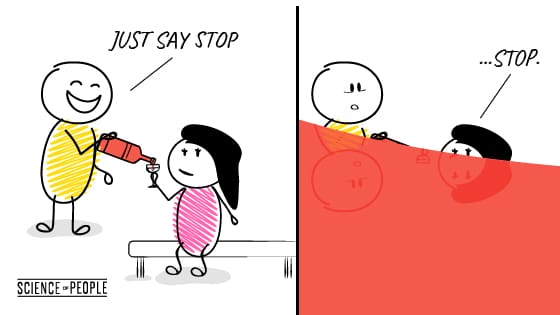
Sometimes it's hard to go cold turkey on pleasing people, so start with small noes. The easiest small noes are over chat or text since you have time to reply.
"It's only by saying 'no' that you can concentrate on the things that are really important."
— Steve Jobs
You can also try saying "no" to these scenarios:
- when a waitress asks if you want to order a drink with your meal
- to a parent who wants to video call waaaay too often (or for too long)
- If an old friend invites you to a party
- when an ambivalent friend asks you to dinner.
- whenever a door-to-door salesman comes knocking
And you don't even have to outright say "no," either. You can also try offering alternatives.
In other words, you don't have to outright reject anyone—you can offer a different solution that can satisfy both you and the other person you're with:
- Waitress asks if you want to order a drink with your meal? Try: "How about just a glass of water (or a refill on your soda)?"
- Old friend invites you to a party? Try: "I'll try, but I might be a bit late."
- Ambivalent friend asks you to dinner? Try: "How about a quick afternoon walk?"
- Door-to-door salesman comes knocking? Try: "Can I take down your number and reach out to you later?"
- Long distance partner wants to video call you every day? Try: "How about every other day?"
Want to really learn how to be socially assertive? I give an entire tutorial in my book Captivate: The Science of Succeeding With People. One of the best ways to stop people-pleasing is to learn how to break free from social anxiety and get more confidence.
My goal is to give you the right formulas to solve ALL of your people problems.
You'll learn, for example…
- How to work a room: Every party, networking event, and social situation has a predictable map. Discover the sweet spot for making the most connections.
- How to read faces: It's easier than you think to speed-read facial expressions and use them to predict people's emotions.
- How to talk to anyone: Every conversation can be memorable—once you learn how certain words generate the pleasure hormone, dopamine, in listeners.
I know how it feels to be a people pleaser. So here's my bonus for you:

↑ Table of Contents ↑
Unlock the Secrets of Charisma
Control and leverage the tiny signals you're sending – from your stance and facial expressions to your word choice and vocal tone – to improve your personal and professional relationships.
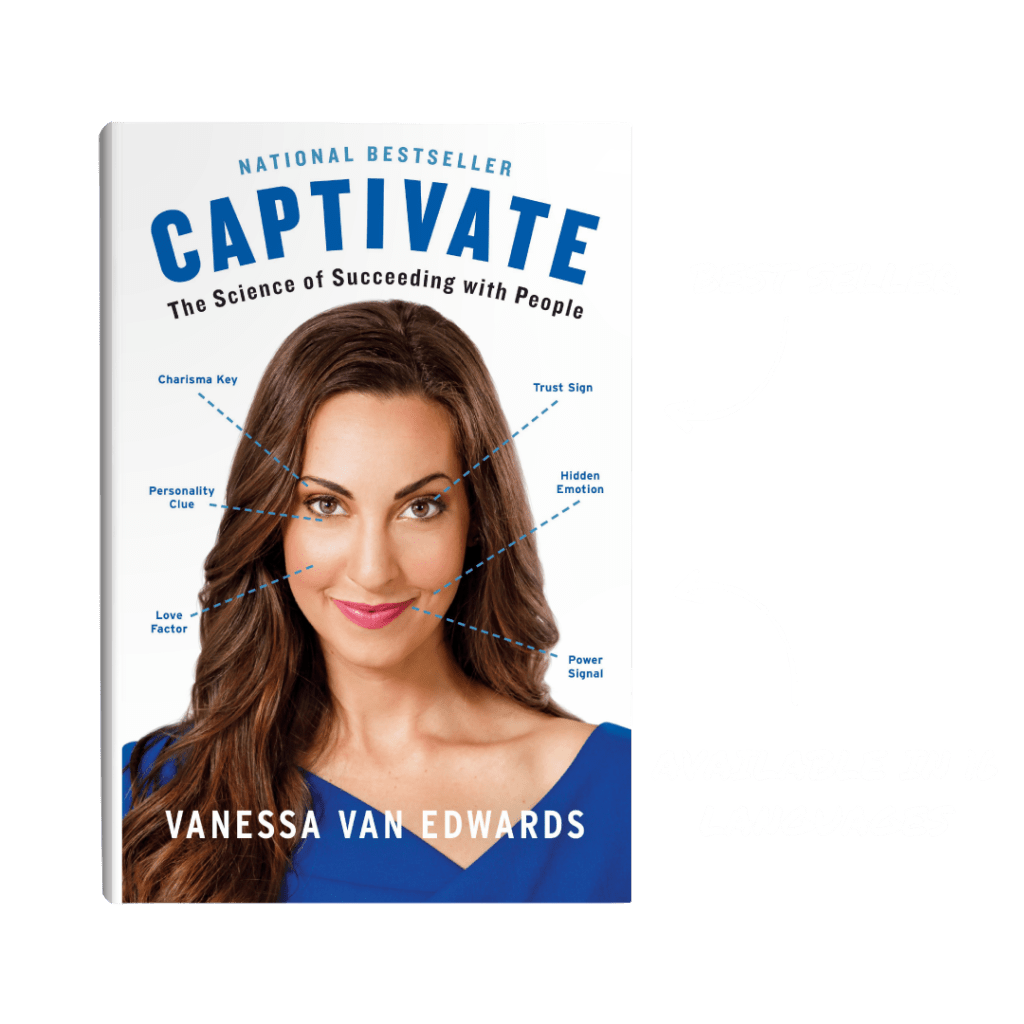
↑ Table of Contents ↑
Succeed with People
Master the laws of human behavior. Get along with anyone, increasing your influence, impact, and income as a result.
↑ Table of Contents ↑
#4: Stop Saying "I Can't"
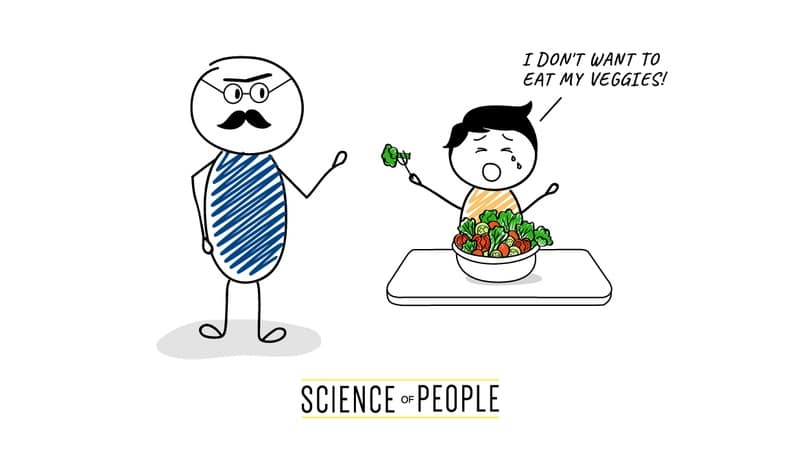
The biggest mistake a people pleaser can make isn't not saying no, but rather how they say no.
- I can't go to the party
- I can't do that project
- I can't talk to you right now
These examples invite someone to say, "But why?" and push you on your boundaries.
Toxic people and fake friends LOVE to push boundaries. They say,
- "It'll be quick!"
- "Just come for a little bit."
- "I promise it won't be a big deal."
A 2012 study published in the Journal of Consumer Research found that saying "I don't" instead of "I can't" allowed participants to gracefully exit unwanted commitments.
Why? Because "I don't" is much more powerful than "I can't" … it also shuts down toxic people faster.
"I don't" establishes a clear boundary, making you sound much more confident and clear in your intentions. On the other hand, people who say "I can't" seem like they're giving an excuse and might have some wiggle room to give.
Try saying "I don't":
- "I don't want to go to the party."
- "I don't want to grab dinner."
- "I don't want to talk now."
Here's an anti-people-pleasing challenge for you: The next time you have an obligation you don't want to do, say "I don't."
↑ Table of Contents ↑
#5: Rewrite Your Story
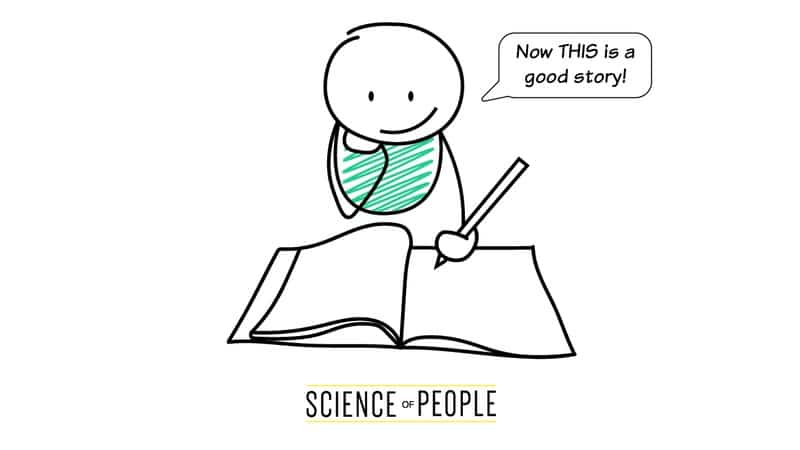
Okay, it's time for a cringe-worthy moment.
I want you to think of a time where you cracked a joke or tried to be funny, and nobody laughed. Or maybe a time where you tried hard to be taken seriously and were completely ignored.
Do you remember a specific scenario? How did it make you feel? Embarrassed? Anxious? Nervous?
Good!
Because here's where you can change your story.
According to the American Psychological Association, a study was conducted in which 269 adults and 125 college students told open-ended stories about meaningful times in their lives:
- The stories were then placed into 2 different categories: stories with "redemption sequences," in which bad events had good outcomes, and stories with "contamination sequences," in which good events had bad ones.
And here's where this story applies to YOU: the researchers found that people who told stories with more redemption sequences were happier than those who didn't.
This means that they rewrote their narrative.
Now think back to your cringe moment. Think of the people surrounding you at the time, and ask yourself:
- How did I make them feel?
- Did they laugh or gain value?
- Do they even care?
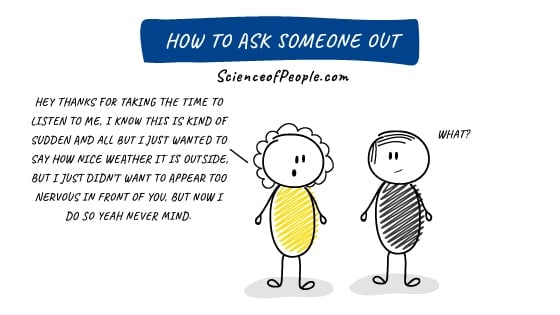
I want you to take the focus away from yourself. When you have a bad memory of failing to people-please, it isn't a knock against yourself. There's nothing wrong with you.
Here is my very personal example. I actually find this difficult to write, but I hope it helps.
I go to a local gym class. One day in class the teacher decided we were all going to run the mile (a competition for time) to kick off the class. I have terrible memories of running the mile. I was really overweight as a child and teenager and remember having terrible social anxiety and hyperventilating during the weekly run-the-mile PE classes.
I should have said, "No thanks!" But instead, as a recovering people pleaser, I waited my turn for a treadmill. As I waited I had all kinds of negative internal banter. I was berating myself for being anxious—I actually can run the mile now and do it regularly, but the timing and public competition aspect was super triggering.
It was my turn.
Not one minute in and I was beginning to get really worked up. I started to feel a panic attack coming on. I stepped off the treadmill and my well-meaning teacher came over to "encourage me." She actually pushed my pace button faster without my permission!
I freaked out, but I didn't say no. Still, I didn't say no…
I finished the mile and burst into tears. My teacher was baffled. I was worked up and blubbered, "I hate this! I hate this so much!" and ran to the bathroom.
There are three things I want to explain about this story.
#1: I should have said no. I didn't because I had an old story about running the mile that was from a long, long time ago. In elementary school we literally had to run the mile. I tried many times to get out of it, but that wasn't an option. Even though as an adult I easily could have said no, I didn't, because my old story was still running my current story.
#2: As soon as class was over and I calmed down, I began to rewrite my story about the mile. I started to time myself on mile runs. I invited a trusted friend on a friendly mile run. We timed ourselves. I began to rewrite this as healthy competition.
#3: My teacher. She was doing her job. And actually, after calming down, I realized I yelled in her face, "I hate this! I hate this so much!" and I was SUPER embarrassed. If I had said no in the first place, I never would have had that response. For weeks I agonized about apologizing to her for my outburst. Finally, one fateful day, I approached her. Here's how that went:
Me: "Hey Callie? Can I apologize to you about something? A few weeks ago I yelled at you after the 1 mile run and I feel really, really bad about it. It was kinda triggering for me and I took it out on you. I should have said no to that activity."
Teacher: "Oh wow, I don't even remember that happening. No problem at all!"
Um, what?! She didn't even remember it!? I had been torturing myself about it and she didn't care. I have rewritten that story too.
When rewriting your story, try to think of the reality, the truth, the emotions, the positive, the underlying growth. Did you learn something? How did you benefit? What value did you offer others? How did this experience change you for the better?
When you learn to take control of your own story, you'll feel much better about pleasing yourself rather than others.
↑ Table of Contents ↑
#6: Know Your Goals
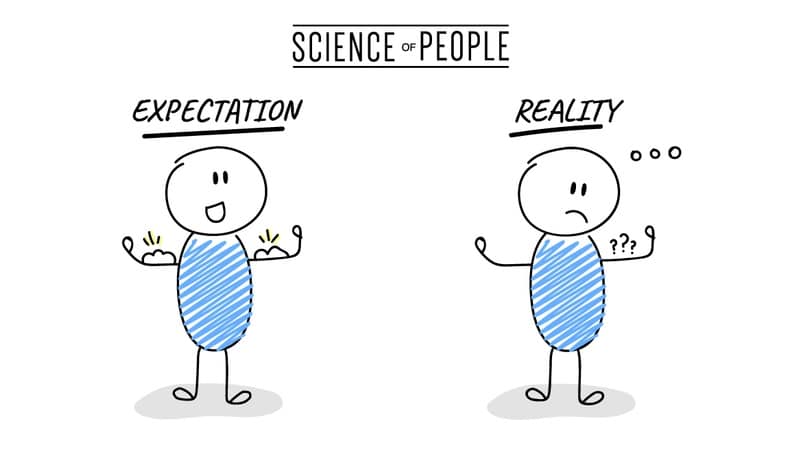
It's much easier to say no to other people's requests when you know what you are saying yes to in your life.
Saying no is easier when you have lots of great things to say yes to.
Once a week I sit down and re-evaluate my long- and short-term goals for the week. I want to know what I am doing this week that gets me closer to where I want to be in 5 years.
When I have this clear in my head, it's much easier to say no to a request because I have to make time for my goals right now.
For example, last year I was going on TONS of podcasts. It was great fun, but it was draining. But I had a really, really hard time saying no. I loved all these entrepreneurs! I wanted to support them! But I couldn't. So week after week I said yes and overbooked myself.
Then, I had an idea for a big bonus for my course People School. I wanted to write a relationship planner for students to journal about the important people in their lives. Great! But a lot of work. I needed hours and hours to work out the kinks and put together something amazing.
You know what I noticed?
Saying no became way easier! Now, every no was a yes for my planner.
So my questions for you are:
- Where do you want to be in 5 years' time?
- What are you doing right now to get yourself there?
- What do you want to make space for?
- What do you want to say yes to?
These answers will make it easier for you to focus on you.
If you're having trouble knowing your goals, check out our ultimate guide on becoming the best version of yourself:
Become the Best You
↑ Table of Contents ↑
#7: Get Rid of Toxic People:
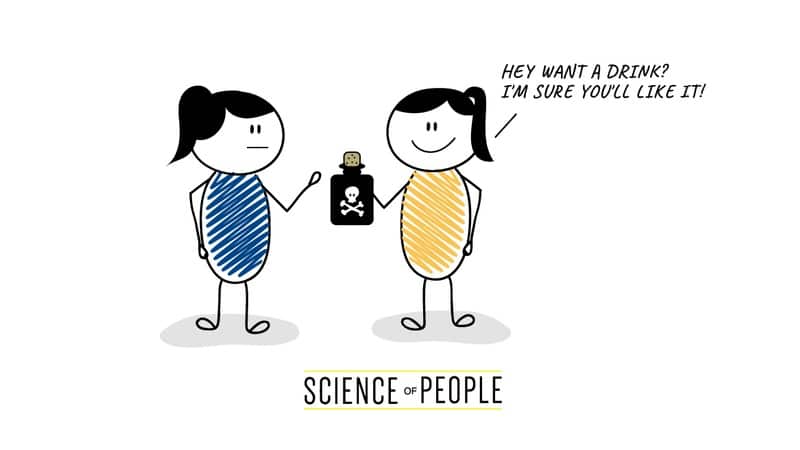
As you have been reading this article, is there one specific person you have been thinking of? Someone who is constantly asking you for things that you are sucked into? Someone who is wasting your time and energy?
Don't worry—you're not alone. We've all been there, and we'll continue to have toxic people entering our lives, doing their little mischief and leaving behind their damage already done.
Unless you know how to spot them!
If you have a toxic person, please get them out! Check out my post on the 7 Types of Toxic People or watch my free training on how to deal with difficult people at work.
↑ Table of Contents ↑
#8: Stop Apologizing
Chances are, you've probably said sorry at least a handful of times in the past week.
According to a survey by Coca-Cola of 2,000 Londoners:
People on average say sorry up to 7 times per day. That's about 200,000 times in one lifetime, or a grand total of 56 hours saying sorry!
The next time you say no, say it with meaning. Don't apologize because you have to prioritize.
Don't feel bad that you have something to take care of. You are standing up for you; and remember, if you don't stand up for you, no one else will.
I know you can do it! It's time to stop people -pleasing and start doing what is right for you! I am rooting for you like Rob Schneider in The Waterboy.
Psst… Try this! Did you know there's a Google Chrome extension called Just Not Sorry? Everytime you write emails using phrases such as, "I'm just," "I think," or "I'm no expert," you'll get a small warning to change your language. Check it out if you're a serial email apologist!
↑ Table of Contents ↑
#9: Optimize Your Apology
Sometimes we all make mistakes and have to own up.
But did you know there is a "good" way to apologize and a 'bad' way?
Once you've really worked on saying no unapologetically, you can work on saying sorry the right way!
But first, pop quiz!
Which of these sayings do you think is the "bad" way to apologize?
- "I'll never do it again."
- "I'm ashamed of myself."
- "It was complicated."
If you answered c, you are correct!
Saying "Sorry, it was complicated" to stitch up a bad situation is an apology containing evasion, according to a 2014 study.
The research, which analyzed 183 celebrity apologies, found that apologies containing denial ("It's not my fault") and evasion ("It was complicated") performed the worst.
Apologies containing corrective action ("I'll never do it again") and mortification ("I'm ashamed of myself") were seen as more favorable.
Are you really sorry?
Here's a challenge for you: write down an apology containing corrective action or mortification, or choose one above. Keep it in the back of your mind for the next time you say you're sorry!
And what if your phrase is too dramatic or inappropriate for a small situation? Then it's probably not worth apologizing over!
Now let's move on to the final tip…
↑ Table of Contents ↑
#10: Unleash Your Internal Validation
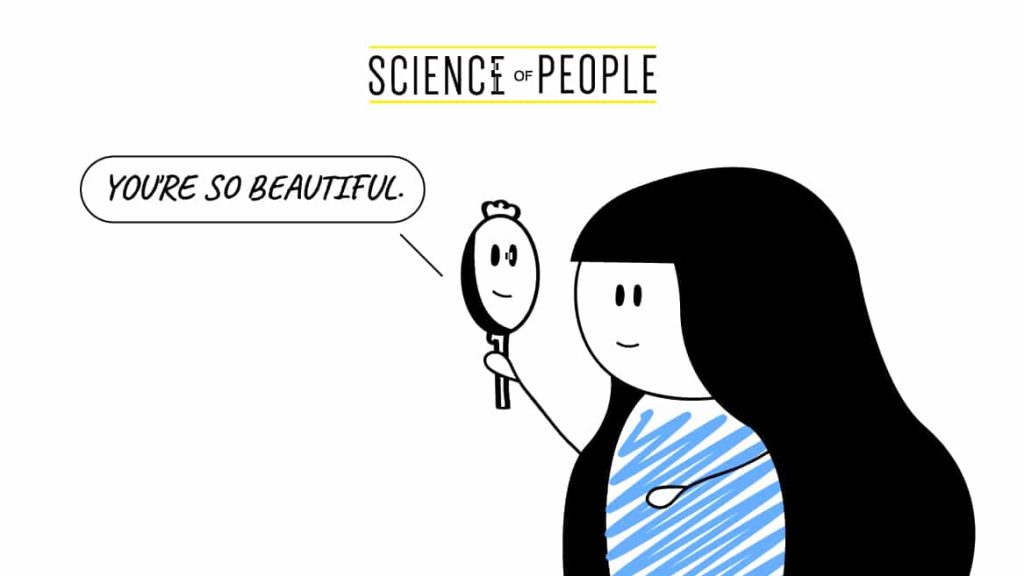
You know my treadmill story above? The hardest part about reliving old stories is that they tend to demoralize you (or you use them to demoralize yourself).
I went right back to my 5th grade self. When I felt unliked, fat, and clumsy.
It's hard to say no when you have low self-esteem or a poor sense of self.
Most people pleasers are like me in this situation: desperate for validation and appreciation.
One study conducted by the University College London and Aarhus University in Denmark actually found that we can tell who are validation seekers simply by looking at their brain scans.
Here's what happened:
- Researchers gathered 28 volunteers and asked them to make a list of 20 songs they liked, but did not own a copy of.
- They were then asked to rate the songs on a scale from 1 to 10, depending on how much they wanted to own the song.
- The researchers then introduced two musical "experts" who expressed their own opinions about the songs.
Now here's the interesting part…
When the experts' opinions matched those of the participants, the part of the brain associated with reward lit up with activity.
And the greater validation the participants received, the more activity their brains showed!
Some people are programmed to be people pleasers.
But here's the big problem: relying on validation from others means your confidence is purely based on external forces.
I want you to rely on internal validation, not external.
The best way to fight people pleasing is to build up what makes you feel good. If you feel good, you don't need others to make you feel good.
- Do activities that make you feel like a '"baller."
- Hang around people who make you feel awesome without having to do anything for them.
- Enjoy your happiness and don't feel guilty for it.
↑ Table of Contents ↑
How to Be Happy
↑ Table of Contents ↑
#11: You're Not Pizza
Okay so imagine you're at a party or event…
What's the one food that they always bring out?
Yep, it's pizza!
You can't please everyone. You're not pizza.
Pizza is great and all, and there's nothing wrong with a good slice of pizza or two, but the problem is pizza is the default… You kind of expect it to be there at every single social event.
No one's surprised, and people take it for granted (it's just pizza, right?).
Now just imagine if you're at a party and someone brings out a hot dish of filet mignon, crème brûlée, or (if it's a vegan party) crispy spicy tofu!
Now that's something special!
Don't be the default.
Don't be boring.
And remember…
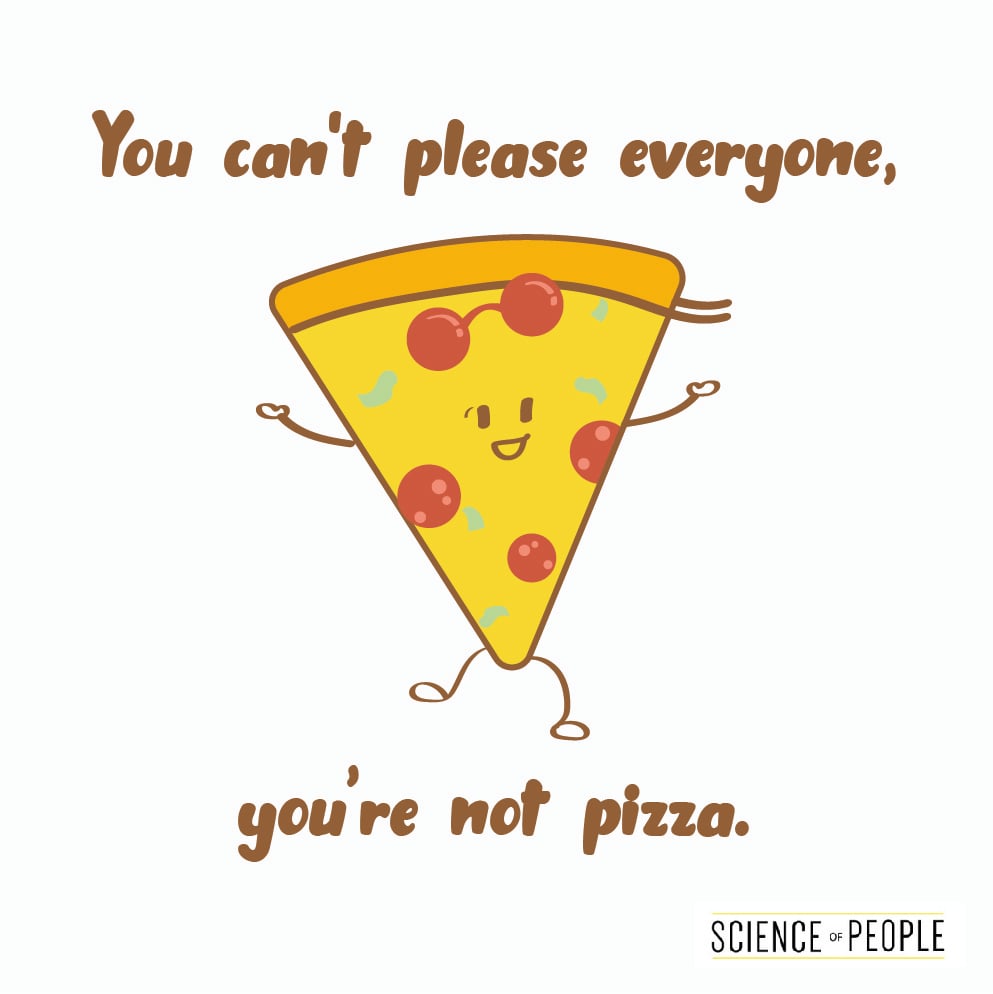
Please the right people!
Source: https://www.scienceofpeople.com/people-pleaser/
0 Response to "I Am Eager for Continuous Selfimprovement"
Post a Comment